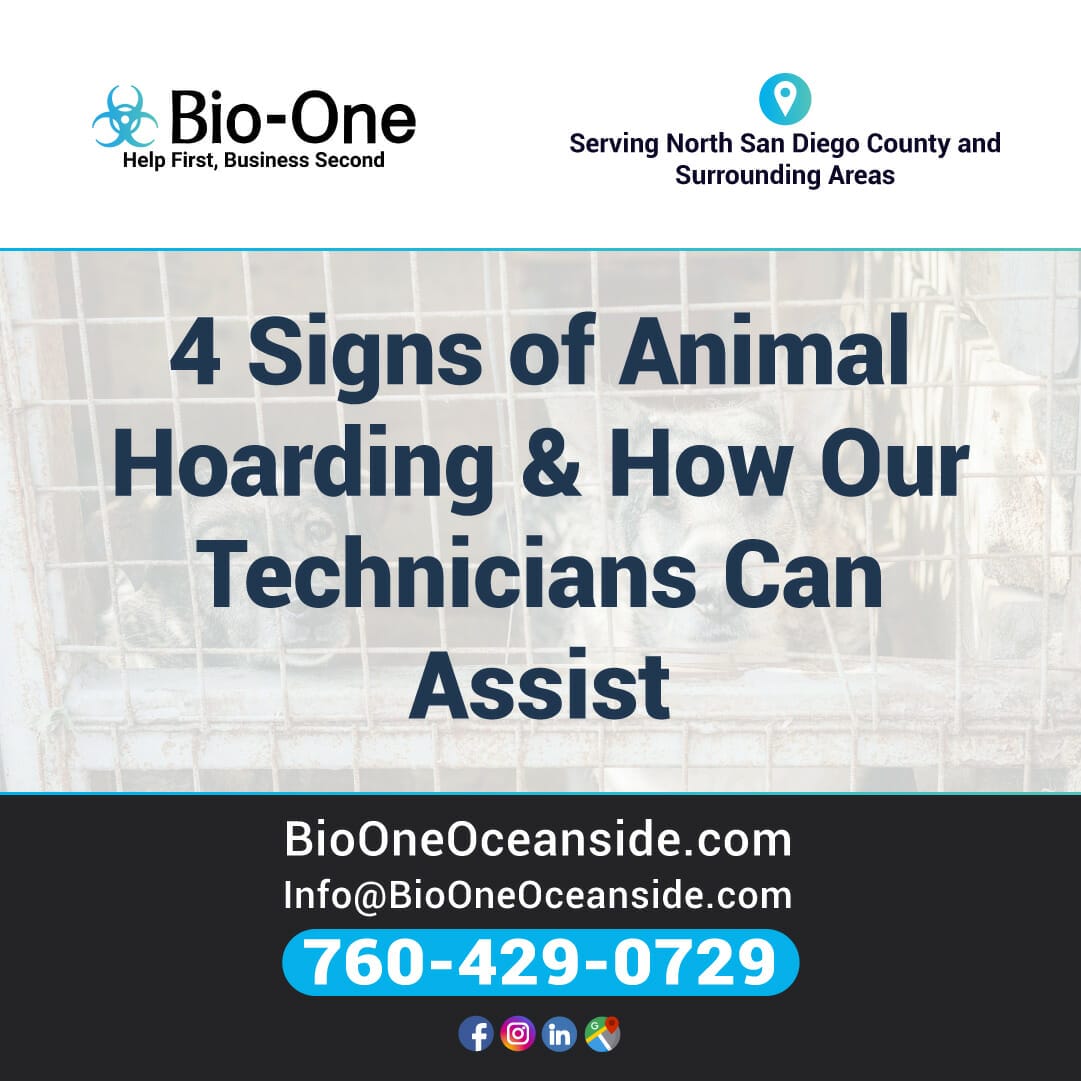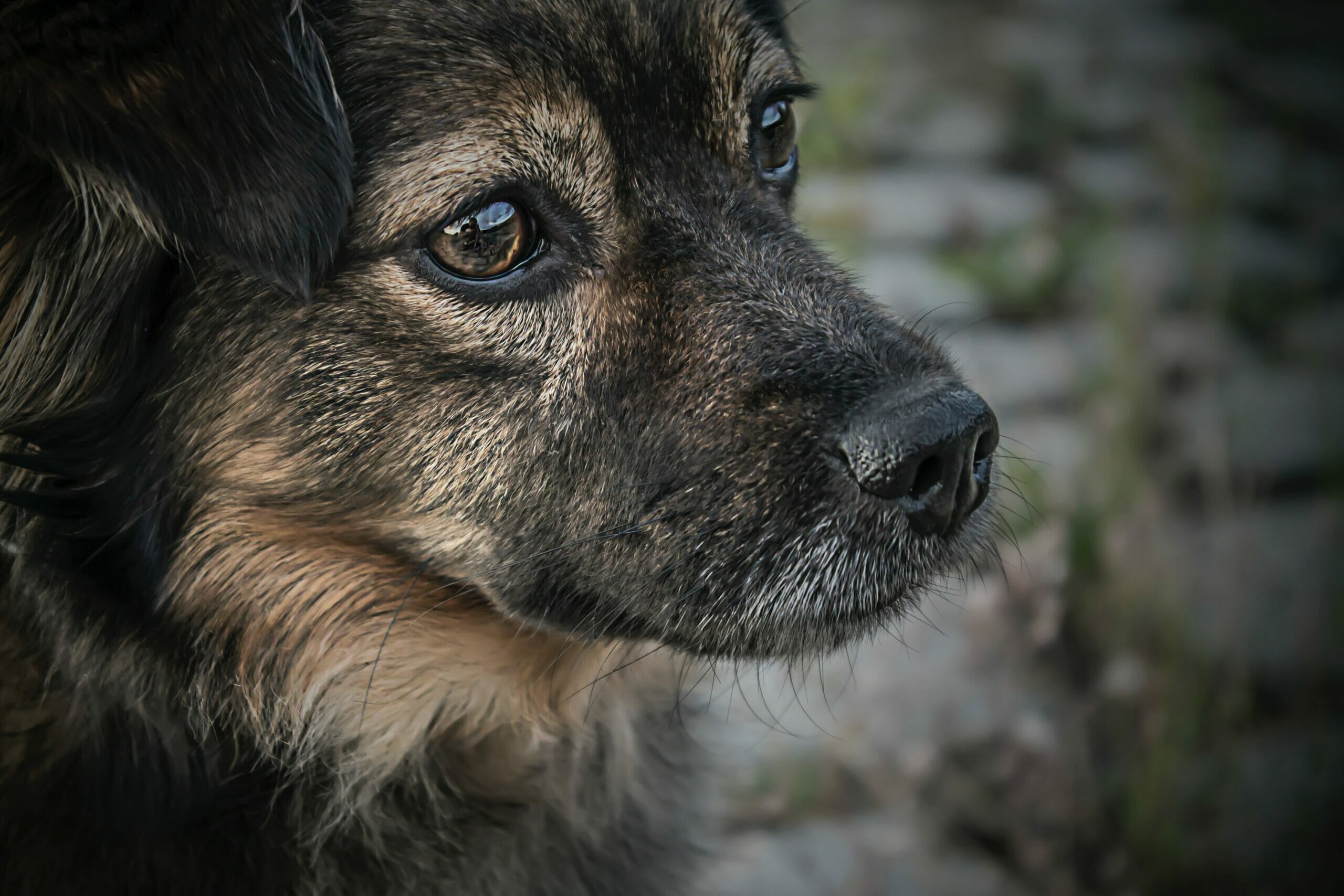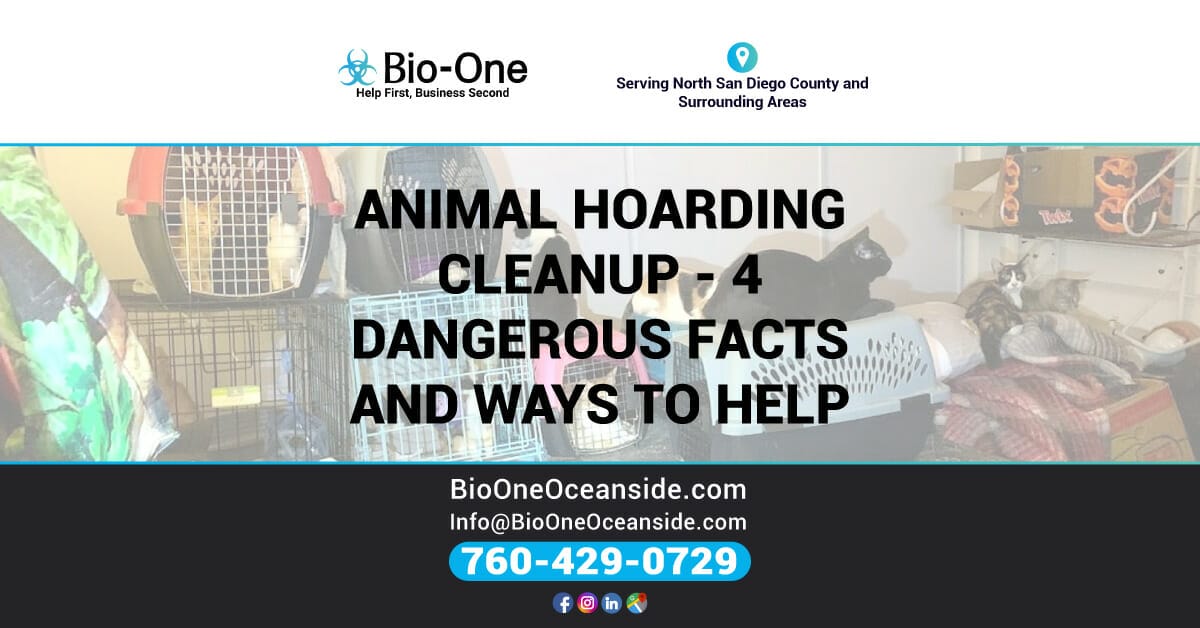
Animal hoarding is more complex than a regular cluttered scenario, as it can affect not only the mental health of the individual but also the well-being of animals. Unfortunately, animal hoarders often struggle to recognize their behavior as harmful, and may not seek help until they have reached a crisis point. That’s where our team of technicians can intervene. In this blog post, we’ll be discussing the four signs of animal hoarding and how our technicians can assist with animal hoarding cleanup.
One of the most common signs of animal hoarding is overcrowding. Hoarders typically have more animals than they can properly care for, leading to poor nutrition, and a lack of medical care. Overcrowding in animal hoarding often results in unsanitary living conditions. The accumulation of animal waste can significantly increase the risk of disease transmission among the animals and the hoarder.
In addition, these conditions can also result in odor problems, attracting insects and vermin, further complicating the situation. Our technicians can assist by removing any traces of waste and hazardous materials from the property and providing the necessary care and supplies.

In animal hoarding situations, the animals may be malnourished and uncared for. The hoarder may not even be aware that this is happening. Our technicians can provide assistance by working with animal welfare organizations, and government entities to remove all the animals from the home while offering the hoarder the necessary help to overcome their reality.
A strong odor of ammonia or feces can indicate a hoarding situation. The odor may be so strong that it is dangerous to breathe, and can leave permanent damage to the property!
Animal hoarders may struggle with depression, anxiety, or other mental health issues. It is also possible that they may be facing the consequences of a traumatic event. Our technicians can help by providing referrals to mental health professionals and providing support for the individual and everyone involved in these emotionally taxing situations.

Hoarders often deny that their behavior is a problem or that they are neglecting their animals. This denial may be so strong that they will not seek assistance until it’s too late. The consequences can be fatal, not only for the victim but for the animals as well. Our technicians can assist by helping the hoarders recognize their behavior and identify potential solutions, like counseling or animal fostering solutions.
Hoarders may exhibit a range of behaviors related to the hoarding of animals. They may be overly attached to the animals, possessive, or obsessively collect items related to their pets. These behaviors can lead to social isolation and make it difficult to seek help. Our technicians can assist by providing compassionate and understanding support and helping the individual receive professional support.
Dealing with animal hoarding can be an overwhelming and stressful experience, but with the help of our experienced technicians, it's possible to navigate the situation and get the care and support necessary for both the animals and the hoarders. By recognizing the signs of animal hoarding, we can intervene early and prevent the situation from escalating.
If you or someone you know is struggling with animal hoarding, please don't hesitate to reach out to us for assistance and guidance. Remember, there is hope and help available for those who need it!


Individuals struggling with animal hoarding might not be aware of the unintentional harm they’re inflicting on the animals because they believe they’re doing the right thing by keeping them out of the streets. Hoarding is a complex issue. Fortunately, help is available. Bio-One of Oceanside’s animal hoarding cleanup technicians know that hoarding can be perceived by many as just a problem that needs to be solved, addressed, and taken care of… without looking into the root of the problem.
A person struggling with animal hoarding is most likely to be struggling with mental health issues, and they need help (even if they don’t see it) instead of being treated as a problem.
Now, there’s no denying that hoarding is a public health issue. However, it doesn’t mean that it should be addressed without compassion and empathy, especially when it comes to animal hoarding, an extreme situation where everyone’s lives are affected, especially the lives of the creatures the individual mistakes as helping.
Many people have multiple pets, which doesn’t make them animal hoarders. Animal hoarding is the specific situation where an individual is housing more animals than they can take care of with minimum health, sanitation, and welfare standards. The most common signs of an individual struggling with animal hoarding include:
People struggling with animal hoarding won’t admit that they have a problem. They might have the best intention of helping and taking care of animals, but the living conditions associated with extreme animal housing make it difficult or almost impossible to provide decent care to these creatures. And not only are the animals affected, but the individuals as well.
This represents an important biohazard risk of infection for animals and individuals. If animals don’t have areas designated for feeding, bathing, and physiological needs, they risk getting sick and infected from waste.
As for humans, they are highly susceptible to these dangerous environments. The sad part of this narrative is that individuals struggling with animal hoarding will go out of their way to try to accommodate animals, so much so that they’ll neglect themselves, not knowing that animals are also being affected by this dangerous cycle.
Animal urine and feces create ammonia gases that can be toxic to humans. Also, a house with poor, unhealthy living conditions usually has very low air quality because of contamination and filth. This is a special health risk for everyone involved, as they can become ill from breathing this toxic air. Bio-One’s animal hoarding cleanup technicians are prepared to effectively contain and remediate areas affected by animal feces and urine, ensuring the environment returns to a habitable, safe state for everyone involved.
Animal hoarding scenarios are difficult to approach. It’s hard to see someone who might be willing to help animals being overwhelmed by their misunderstanding, sense of responsibility, and frustration from not being able to provide better care for the creatures they care for.
Animals suffer from not having adequate living conditions, and it’s not something they can control… after all, they are animals. An individual struggling with animal hoarding is overwhelmed and unable to provide decent health and nutrition to these creatures. Both animals and individuals are just trapped in this mistaken, misguided intention of helping, loving, and being loved.
In the most extreme cases, animals can die in these deplorable conditions, so it’s important to attack a possible hoarding situation with extreme care and compassion for everyone involved.
The American Society for the Prevention of Cruelty to Animals Ⓡ (ASPCA) listed simple ways to help individuals and animals that might be victims of hoarding situations:
If someone you know is struggling with animal hoarding, let Bio-One assist and help you. Our team of animal hoarding cleanup technicians is professionally trained to approach these scenarios with utmost care and compassion for everyone involved. Bio-One also works closely with Law Enforcement and Government agencies to assist families and individuals in all types of challenging situations.

Bio-One of Oceanside is the #1 Disinfection, Sanitation, and Decontamination Company in North San Diego County, providing professional, industry standards services in all kinds of extreme scenarios:
Bio-One of Oceanside springs into action to assist survivors when a traumatic event occurs. We work with local law enforcement, emergency responders, victim advocacy organizations, hoarding task forces, apartment communities, and insurance companies to ensure that you receive the greatest service feasible.
Bio-One is a proud member of the Southern California Rental Housing Association and Carlsbad, Oceanside, and Vista Chambers of Commerce. Bio-One serves all of San Diego County and neighboring regions, including Oceanside, Carlsbad, Vista, Fallbrook, Escondido, San Marcos, and Bonsall.
We also serve the Southern Orange County cities: San Clemente, Dana Point, Rancho Mission Viejo, Laguna Niguel, Ladera Ranch, San Juan Capistrano, Aliso Viejo, Laguna Woods, Laguna Beach, Lake Forest, Rancho Santa Margarita, Irvine, and Costa Mesa.
Our services are available 24/7, 365 days a year. Give us a call at 760-429-0729.